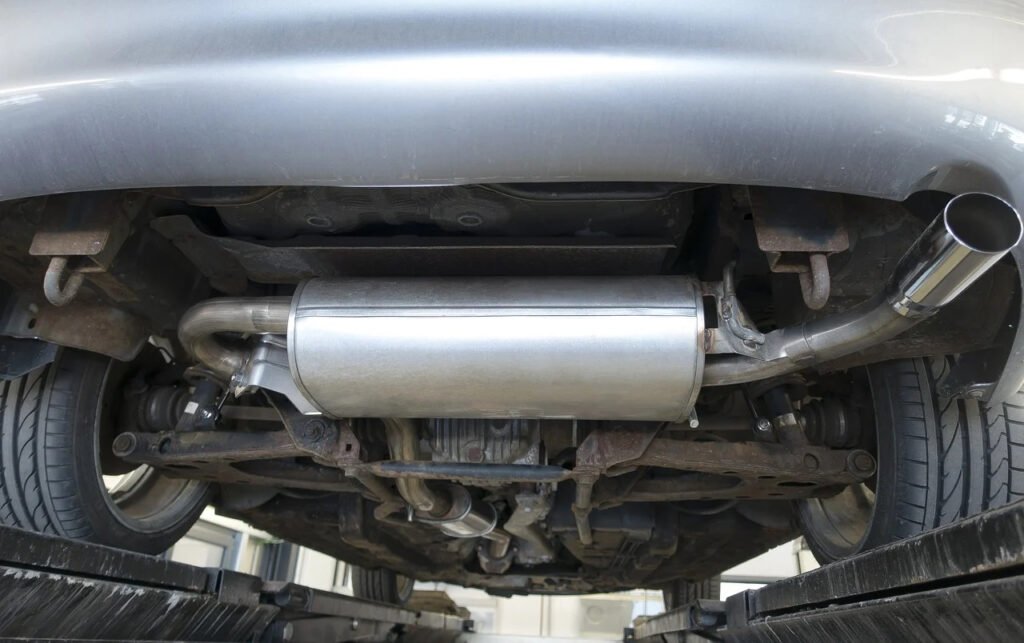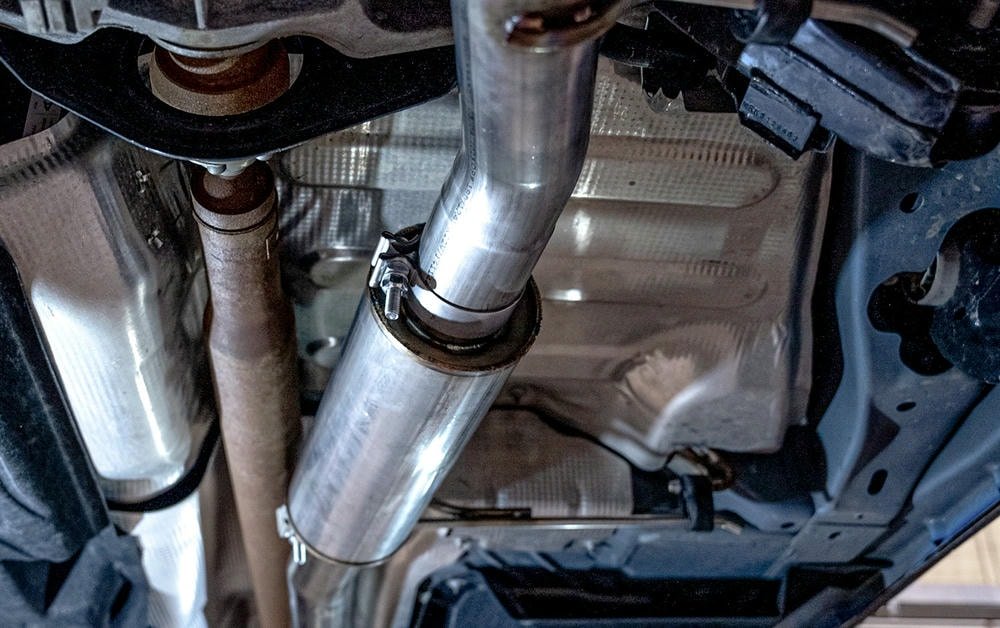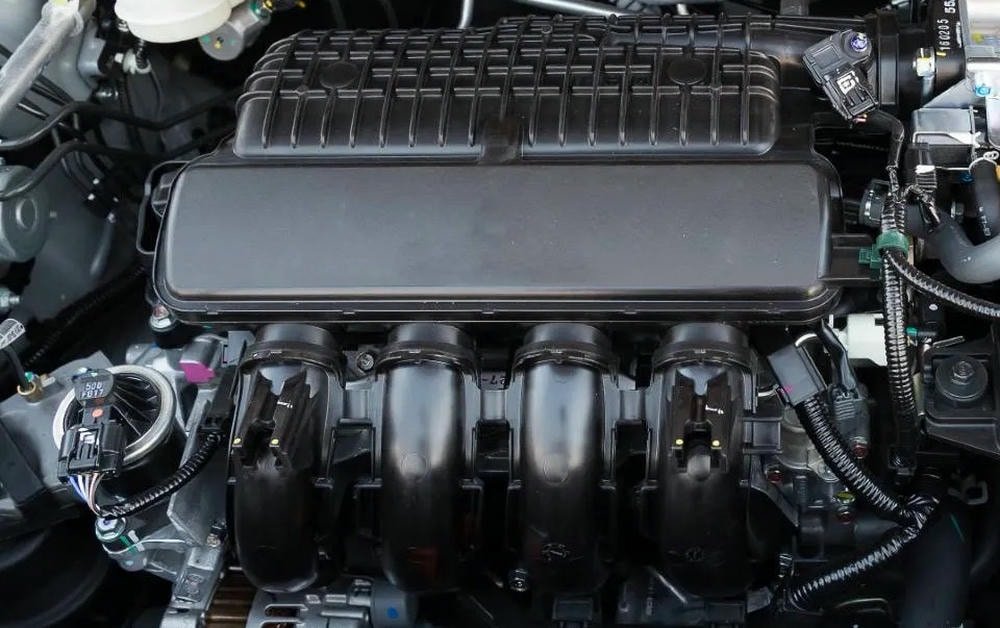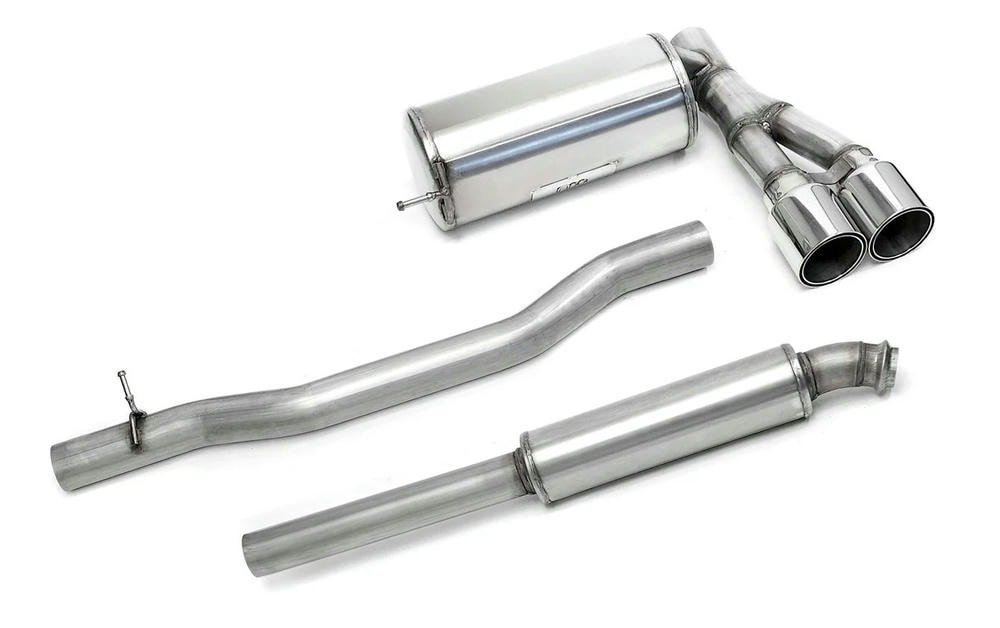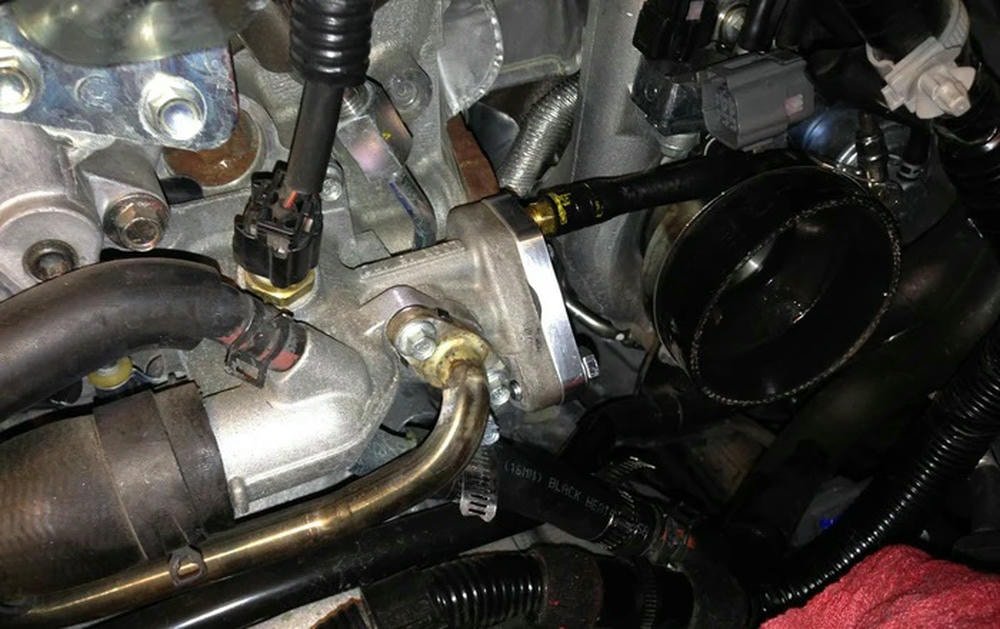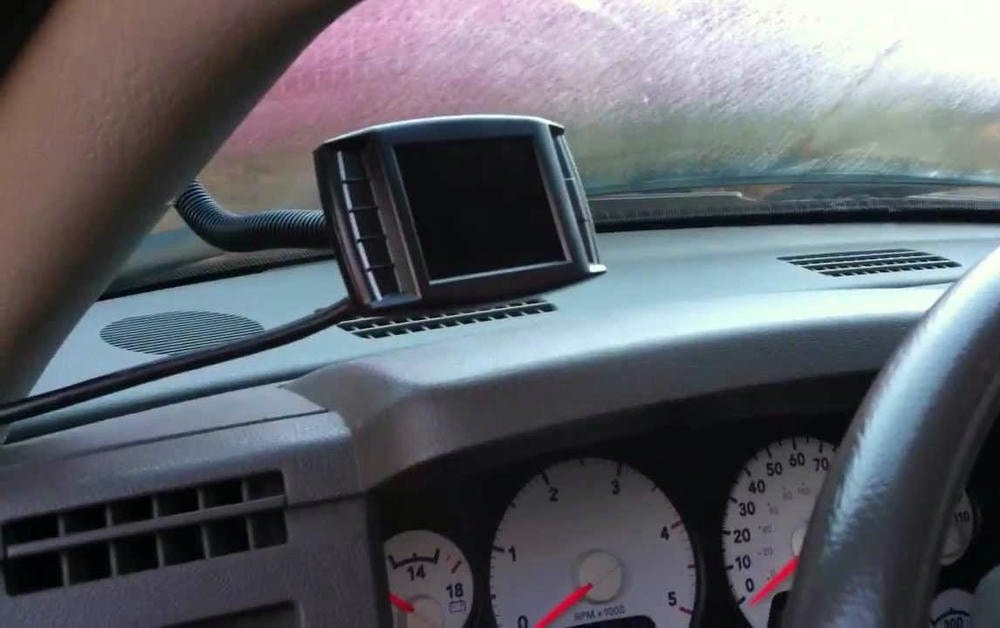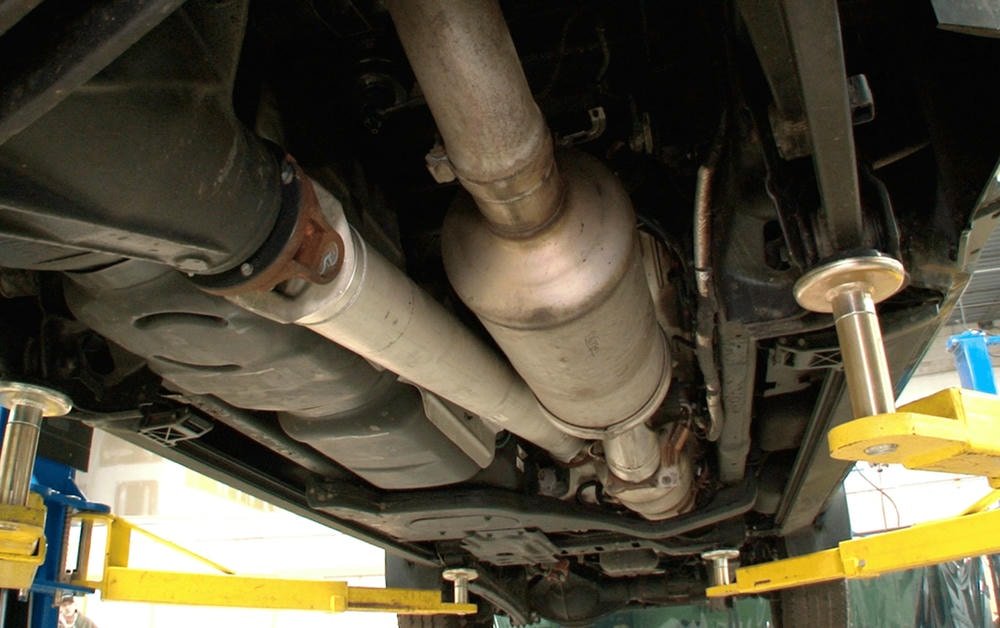A muffler delete is a choice some diesel truck owners make to change how their vehicles sound and perform. This process involves removing the muffler from the exhaust system. The main job of a muffler is to reduce noise, so taking it off makes the truck louder and can alter its engine tone.
Some people do this because they want their trucks to sound more powerful or for specific uses like racing or driving off-road where loud noises are not a problem.
Removing the mufflet can also affect how the truck runs. It might improve horsepower and performance by lowering exhaust back pressure, although results vary with different trucks.
However, there are legal and environmental issues to think about because making a vehicle louder may break noise rules, and changes in emissions could fail to meet standards.
Not all trucks will use gas more efficiently after this modification; some might even use more fuel if driven harder due to enjoying the new sound.
Keep reading for insights on when a muffler delete could be good or bad for your truck.
Table des matières
ToggleUnderstanding Muffler Deletes
A muffler delete removes part of the exhaust system to change how a car sounds and performs. This action affects sound, power, and even fuel use in vehicles like diesel trucks.
Définition et fonctionnalité
Muffler deletes remove the muffler from a vehicle’s système d'échappement. This part usually reduces noise. Without it, the truck sounds louder and more raw. The idea is simple: take off the muffler, and let the engine breathe better.
This often leads to a deeper roar from diesel trucks.
Removing the muffler changes how exhaust gases flow out of a vehicle.
Owners do this for various reasons like improving performance or just liking how it makes their truck sound. It’s known that less restriction in an système d'échappement can sometimes boost horsepower.
Though results vary, many find that their diesel engines respond well to this kind of modification, especially when combined with other upgrades like turbocharged engines and custom exhaust setups.
How a Muffler Delete Changes the Exhaust System
A muffler delete removes the muffler from a truck’s exhaust system. This changes how the system works. The exhaust can flow freely without passing through the muffler. This part usually reduces noise and controls the sound of a vehicle.
Without it, the engine’s roar is louder and clearer. Diesel truck owners notice a big change in sound right away. They often do this for better performance or a stronger exhaust tone.
The process also impacts how gases move out of an engine. It can make a diesel truck run more smoothly because there is less pressure holding back the exhaust gases. Yet, every truck reacts differently to this change.
Common Reasons for Performing a Muffler Delete
Diesel truck owners often look for ways to improve their vehicle’s performance and sound. A muffler delete is one popular method that brings changes to the système d'échappement.
- Increase in sound level: Truck owners want a louder, more aggressive exhaust note. Removing the muffler amplifies the sound coming from the engine, giving the truck a more powerful presence on the road.
- Enhanced performance: The removal of the muffler can result in fewer restrictions in the exhaust flow. This potentially increases puissance et couple, making the truck perform better, especially during heavy acceleration or when hauling loads.
- Better exhaust tone: Besides just increasing volume, a muffler delete changes the quality of the sound. Owners looking for a specific exhaust tone find that removing the muffler offers a deeper, more distinct rumble than what factory setups provide.
- Weight reduction: Mufflers add extra weight to vehicles. By taking them out, owners slightly reduce their truck’s weight, which can contribute to improved fuel efficiency and performance.
- Desire for simplicity: Some diesel truck enthusiasts prefer a more straightforward exhaust system without unnecessary components. Eliminating the muffler simplifies the setup, making it easier to maintain and modify in future.
- Appearance improvement: For many people, performing a muffler delete is also about aesthetics. Trucks with modified systèmes d'échappement often appear more rugged and customized, appealing to those who want their vehicle to stand out.
Each reason highlights different ways diesel truck owners aim to enhance their driving experience through modifications like a muffifier delete.
Effects of a Muffler Delete
Removing a muffler changes how a car sounds and performs. It makes the exhaust louder and can alter how the engine runs.
Sound Increase and Exhaust Tone Changes
A muffler delete makes a diesel truck louder. This change happens because the muffler, which normally reduces noise, is gone. The sound of the engine becomes clearer and rawer. Truck owners might like this deep rumble, as it reflects power.
The exhaust tone also changes after a muffler delete. Without the muffler, the engine’s true sound comes out. The tone depends on many things like engine size and design. Diesel truck owners often find that their vehicle sounds more aggressive.
After removing the muffler, my truck’s growl turned heads everywhere.
Potential Performance Gains
Removing the muffler can lead to meilleure circulation de l'air through a vehicle’s système d'échappement. This often results in a minor increase in horsepower. For diesel truck owners, this means the engine might work a bit easier.
Avec less back pressure, trucks can experience more efficient performance. This change is not just about sound; it also touches on how the truck feels during acceleration.
Owners looking for upgrades like performance systèmes d'échappement or engine tuning find muffler deletes appealing. These changes aim for better speed and power on and off-road. Upgrading other parts of the système d'échappement along with the delete can further enhance these benefits.
It’s all about finding that balance between power, sound, and efficiency without breaking any laws or harming the environment.
Impact on Fuel Efficiency
A muffler delete may change how much fuel a diesel truck uses. Trucks need air to run well, like humans need oxygen. A muffler delete lets the système d'échappement send out air faster. This can make the engine work better because it gets rid of waste air quicker.
Yet, this might not always save gas. For some trucks, getting more air in and out quickly helps them use less fuel for each mile. But for others, it can lead to using more fuel, especially if the driver likes to hear the louder sound and drives harder.
From what owners have shared on message boards and auto repair shops have seen, results vary. Some diesel truck owners noticed a small improvement in miles per gallon after doing a muffler delete.
Others found no difference or even used more fuel because they enjoyed pushing their trucks harder with the new sound. It shows that while a muffler delete can affect how efficiently a truck uses fuel, other factors like driving habits also play a big role.
Legal and Environmental Considerations
Muffler deletes can lead to questions juridiques. Many places have laws about noise pollution. Loud trucks might break these rules. Owners might face fines if their truck is too loud. Emissions standards are another concern.
Removing the muffler can affect how clean a truck’s exhaust is. This could cause problems with emissions tests.
Environmental impact is also important to think about. Muffler deletes can increase sound pollution, which bothers people and wildlife. They may reduce air quality by changing the système d'échappement of diesel trucks, making them release more harmful gases into the air.
Truck owners should check local laws on sound and emissions before deciding on a muffler delete.
Pros and Cons of Muffler Deletes
Removing a muffler can change how a diesel truck sounds and performs. It makes the truck louder and might make it run a bit faster. Yet, this upgrade could lead to trouble with noise rules and air pollution laws.
Deciding if it’s right for your vehicle depends on what you want from your truck’s sound and speed.
Advantages in Sound and Performance
A muffler removal can notably amplify a diesel truck’s sound, making it more prominent and attention-grabbing. This adjustment creates a richer exhaust tone, which many owners find attractive.
The modification is not solely about increasing the volume; it also alters the sound quality. The altered système d'échappement channels a raw, commanding noise, befitting the truck’s power.
Muffler removals can boost performance by lessening back pressure.
Une diminution de la contre-pression peut entraîner des progrès mineurs en termes de puissance et d'accélération. Pour les camions à hautes performances, ces améliorations sont encore plus perceptibles. En outre, l'absence de silencieux allège le véhicule, ce qui améliore encore ses performances globales.
Il faut toutefois garder à l'esprit que les effets varient en fonction d'autres ajustements et de l'agencement particulier du véhicule.
Inconvénients potentiels (par exemple, plaintes concernant le bruit, respect des normes d'émissions)
Le retrait du silencieux rend les camions plus bruyants. Cela peut entraîner plaintes pour bruit des voisins ou d'autres personnes se trouvant à proximité. Dans de nombreux endroits, il existe des lois sur le bruit qui limitent le niveau sonore des véhicules. Les camions dépourvus de silencieux enfreignent souvent ces règles.
Le retrait du silencieux affecte également conformité aux émissions. The exhaust system helps control pollution from the truck’s engine. Without a muffler, the truck might not meet normes juridiques pour la qualité de l'air.
Cela signifie qu'il pourrait échouer à un test d'émissions, ce qui entraînerait amendes ou problèmes pour obtenir l'autorisation d'utiliser le camion sur la route.
Situations où la suppression du silencieux est la plus bénéfique
La suppression du silencieux peut modifier le son et les performances d'un camion diesel. Il s'agit d'une amélioration du système d'échappement peut s'avérer très utile dans certaines situations.
- Événements de course: Les propriétaires de camions diesel participent souvent à des événements de course where louder exhaust sound and minimal restrictions help improve performance. A muffler delete enhances the exhaust tone, which is a big plus on the track.
- Conduite hors route: Les camions utilisés en tout-terrain bénéficient d'une suppression du silencieux car elle réduit le risque d'endommagement du système d'échappement par les pierres et les débris. Il améliore aussi légèrement la puissance, ce qui est utile sur les terrains accidentés.
- Camions d'exposition: Pour les camions utilisés dans les expositions, une note d'échappement plus agressive leur permet de se démarquer. La suppression du silencieux permet d'améliorer le son et d'attirer l'attention sur le véhicule.
- Modifications de haute performance: Les camions diesel ayant subi des modifications pour augmenter leur puissance, comme des turbocompresseurs plus puissants ou des systèmes d'alimentation améliorés, obtiennent souvent de meilleurs résultats en supprimant le silencieux. Les réduction de la contre-pression peut conduire à des gains de puissance notables.
- Zones sans ordonnance sur le bruit: Dans les pays qui ne disposent pas de lois strictes en matière de contrôle du bruit, la suppression du silencieux permet aux propriétaires de camions diesel de profiter d'une conduite plus bruyante sans avoir de problèmes juridiques liés à des plaintes pour nuisances sonores.
- Véhicules plus anciens non soumis aux tests d'émissions: Pour les anciens camions diesel qui ne sont pas soumis à des tests d'émissions, le retrait du silencieux n'entraînera pas de problèmes de conformité légale en matière d'émissions.
- Préférence personnelle pour le son: Certains propriétaires préfèrent simplement entendre le rugissement profond de leur moteur diesel sans être gênés par un silencieux. Pour eux, l'amélioration du son est une raison suffisante pour supprimer le silencieux.
Each situation shows how modifying an exhaust system by removing the muffler can cater to different needs – from performance impact to purely enjoying a more robust sound from their diesel truck.
Conclusion
John Carter, expert en ingénierie automobile avec plus de 20 ans d'expérience, partage ses connaissances sur les sujets suivants suppressions de silencieux. He has a master’s degree in mechanical engineering and has worked on numerous exhaust system designs for performance vehicles.
Son travail comprend plusieurs brevets liés aux technologies d'échappement.
Carter explains that removing the muffler increases sound and may improve engine output. This change lets the engine push out exhaust gases more freely, potentially boosting power.
Il cite des études montrant de légers gains de puissance pour certains modèles.
Il soulève également des questions de sécurité et d'éthique concernant les suppressions de silencieux. Sans silencieux, les véhicules peuvent produire des niveaux sonores beaucoup plus élevés, ce qui pose des problèmes juridiques dans les régions où les lois sur le bruit sont strictes.
M. Carter insiste sur la nécessité pour les conducteurs de vérifier les réglementations locales avant de procéder à cette modification.
En guise de conseil pratique, M. Carter suggère d'utiliser un silencieux supprimé principalement sur les voitures utilisées pour la course ou la conduite tout-terrain, où les restrictions sonores sont moins strictes. Pour la conduite de tous les jours, il conseille de tenir compte de l'impact sur les voisins et des lois locales.
Comparant les suppressions de silencieux à d'autres modifications, M. Carter note qu'elles constituent un moyen peu coûteux de modifier le son et d'améliorer légèrement les performances, mais il met en garde contre les inconvénients potentiels tels que l'augmentation des émissions et les amendes éventuelles.
Enfin, Carter donne son verdict : Les suppressions de silencieux peuvent être bénéfiques pour des utilisations spécifiques, mais elles ne conviennent pas à tous les conducteurs en raison de l'importance de l'impact sur l'environnement. implications juridiques et sociales des systèmes d'échappement plus bruyants.
He recommends weighing pros cons carefully before deciding.
FAQ
What happens when you delete a muffler from your vehicle?
Deleting a muffler, an exhaust system modification, changes the way your car sounds and performs. The absence of a muffler can result in louder engine noise and may impact performance.
How does a muffler delete affect sound?
A muffler deletion typically results in increased engine noise due to the lack of this component that usually dampens sound vibrations within the exhaust system. This could potentially lead to deafeningly loud noises depending on the specific make and model of your vehicle.
What are some benefits and drawbacks of a muffler delete?
The primary benefit of a muffler delete is often perceived as an improvement in vehicle performance, although this varies between different models and types of vehicles. However, it’s important to consider potential cons such as increased noise levels which might be disruptive or even illegal in certain areas.
Does deleting my car’s muffler have any impact on its performance?
Yes, removing the muffler can influence vehicle performance by reducing back pressure in the exhaust system which could increase horsepower output. However, please consult with a professional before making any modifications like these to understand all pros and cons fully.

